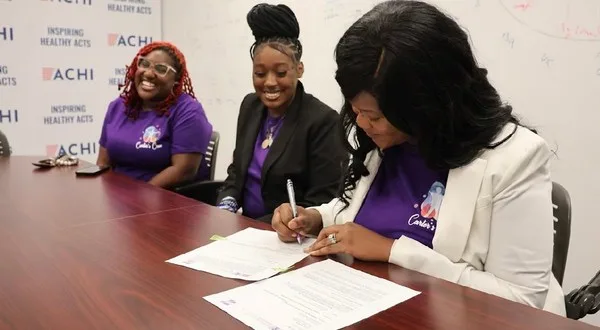
Carter’s Crew helps teens in Central Arkansas who have been in the justice system or live in crime-heavy neighborhoods; it stems from Govan’s personal experience of being considered “at-risk” in her own life.
With $200,000 in settlement funds from the Arkansas Opioid Recovery Partnership, the nonprofit will add opioid prevention education to its repertoire.
and identify areas they need assistance with. Substance abuse is a major one, right behind mental health.”
More than 108,000 people in the United States died of a drug overdose in 2023, according to preliminary data from the Centers for Disease Control and Prevention. The same data shows Arkansas had 572 drug overdose deaths in 2023, though the figure could change as the data is finalized.
Carter’s Crew will use the settlement funds to hire a peer recovery specialist, substance abuse educator and a case manager tasked with mitigating risk factors for misuse among teens. Staff will manage a program that will run four 12-week sessions annually, followed by nine months of follow-up for each participant, Govan said.
The program mimics a 12-step program and participants will be referred for outside assistance, such as inpatient services or medication management, when necessary, Govan said.
The settlement funds will also help staff develop an online opioid prevention curriculum, which Govan said will be the first of its kind in Arkansas for the demographic.
Content will include 30-minute videos led by other young people and quizzes to test participants’ knowledge along the way. They will receive certificates upon completion, and Govan said she’s currently working to have court judges accept them as part of the conditions for teens who are completing substance abuse programs.
The program is similar to one used for medical professionals at the University of Arkansas for Medical Sciences, Govan said.
Along with creating new programs, Govan also hopes the funding will help break down a stigma among different communities.
“In the Black community, people are afraid to bring up the topic of, ‘I’m struggling with being addicted to prescription pills,’ or whatever it may be,” Govan said. “For us… we want families to understand that there are more people out there who are like you, who need this assistance as well. It’s not a bad thing. It’s just something we need to provide services for.”
Breaking down that stigma will hopefully help people feel more comfortable self identifying and letting any agency or healthcare provider know they need help, Govan said.
The funding for Carter’s Crew is part of $26 billion in opioid settlement funds to be distributed nationwide. Of that total, Arkansas is set to receive $216 million over 18 years.
The Arkansas Opioid Recovery Partnership was created in 2022 using city and county settlement funds. The initiative works to distribute funds to projects aimed at abating the opioid epidemic through prevention, treatment and recovery.
Kirk Lane, director of the initiative, said staff look for several features of a project when considering funding, including heart, innovation, location and prevention efforts. For Carter’s Crew, Lane said he was intrigued by the nonprofit receiving referrals from the juvenile courts.
“We look for the heart first,” he said. “If people are looking at the money as money, that’s not the direction we’re wanting to go.”
Every Arkansas county has at least one active program funded by the Arkansas Opioid Recovery Partnership, according to its website. The announcement from Carter’s Crew increased the funded projects in Pulaski County to nine, joining the Pulaski County Sheriffs Office, the Crisis Stabilization Unit at UAMS, the Natural State Recovery Center and others.
was one of the ones that we weeded through,” Lane said. “They were providing something different that the state was doing, was in a county that had a tremendous overdose situation and it was empowering young people that came from strong problem areas.”
Meeting the needs in every Arkansas county is one of Lane’s goals, and he said funding a project in a county that has fewer active programs may be prioritized if it has met the requirements.
Funding opportunities are ongoing, and the Arkansas Opioid Recovery Partnership doesn’t have a deadline for organizations to submit applications. Funding proposals must follow a list of guidelines, including evidence-based strategies to abate the opioid epidemic and signatures from the county judge and mayor where the program will take place.
Pulaski County Judge Barry Hyde and Little Rock Mayor Frank Scott Jr. pledged their support for Carter’s Crew.
After an organization has been awarded funding, the Arkansas Opioid Recovery Partnership conducts regular check-ins over the course of five years to ensure the goals are being met. The initiative collects quarterly data specific to the milestones of each program and completes an annual review.
If money was distributed to an organization and not used toward abating the opioid crisis, that amount is returned to the Arkansas Opioid Recovery Partnership. So far, approximately $1 million has been returned, Lane said.
To view this story, or for more Arkansas Advocate news updates, click here.
WebReadyTM Powered by WireReady® NSI










